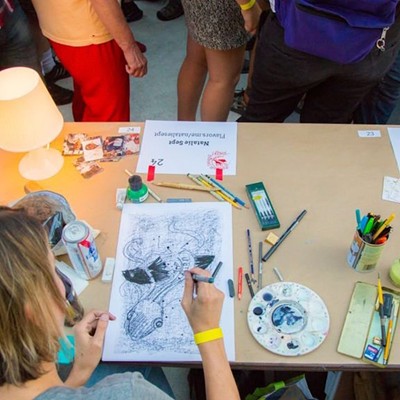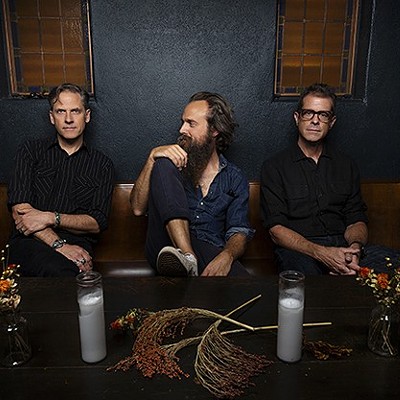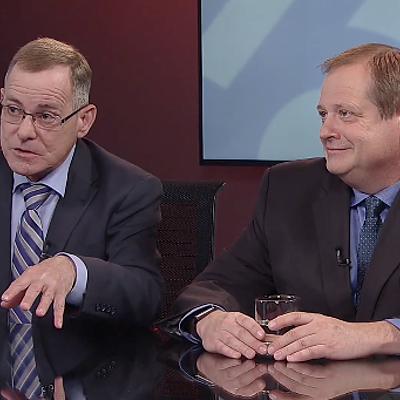This year's theme for the Museum of Contemporary Art's Book Club is a fitting one for a population being slammed with advertisements from political campaigns: Fear and Loathing on the Campaign Trail '12.
The next book club meeting is at 5:30 p.m., Thursday, Sept. 6, and Thomas Frank's What's the Matter With Kansas? How Conservatives Won the Heart of America is the topic of discussion. In November, book-club members will discuss Hunter S. Thompson's Fear and Loathing on the Campaign Trail '72.
Jim Nintzel, the Tucson Weekly's senior writer, will moderate the discussions. The cost is $5 for museum members, and $10 for nonmembers. It includes wine, beer and snacks.
The Weekly caught up with MOCA-Tucson executive director Anne-Marie Russell to get the details.
So the theme for the book club is examining the intersections of art, politics and media. Why did you decide to go with that?
Sometimes, people might not fully apprehend the power of art, and part of our larger educational programming involves teaching people about the importance of art in our history, and ways in which art has been used in the past. So it's really ironic to us that sometimes, art gets dismissed as this fluffy, insignificant thing, when, in fact, our entire world is oriented around images and the power of images. So I think it's our way of reminding the general public about the importance of visual literacy and the power that art can have. It can be used for good or evil. ... The bottom line is there's no denying the power of art. And certainly, when we're going into a campaign season, and when citizens are being bombarded with images, we think visual literacy. And being able to deconstruct (the images), particularly on a screen ... is one of the most important skills that a citizen can have today. If people don't understand how commercials or television or movies are put together, and how they can be sort of deconstructed for their symbolic power, then we're at risk as a citizenry.
What do these books have to do with visual literacy?
I think everyone can agree that screens are the most powerful and prevalent way in which imagery moves forth in the world. So we opened up the book club with The Selling of the President 1968 (by Joe McGinniss), and that clearly was the moment when Madison Avenue met the Beltway. And the book does a really great job of deconstructing how the new medium of television radically changed campaigns. And that's an aesthetic issue, and it's a visual issue. The second book we did was Within the Context of No Context (by George W.S. Trow). Trow's assertion is basically that television has kind of infantilized our culture and made it more difficult for us to think critically.
And the next book?
(What's the Matter With Kansas?) is really about the aesthetic of demographics, and how life becomes lifestyle in the science of polling and demographics—how people get identified as soccer moms or XYZ, and how life turns into lifestyle and gets marketed as lifestyle. It's very much an aesthetic issue in terms of ... identifying and categorizing people's ideas about who they are. We all have the shorthand of the Volvo-driving, latte-drinking liberal elite, or whatever sort of visual image you get from the things that you consume or the activities that we pursue—that's sort of a visual composite of a type of person. The science of polling has become so sophisticated, and all of our consumer habits and Internet trolling habits are tracked, and we have so much more massive amounts of data that put people in different microgroups based on their habits that then get articulated in visual form.
How will the night play out?
You know how book clubs go. There's wine and beer; I always say they're wine clubs with a few discussions of books. But we had really, really wonderful conversations and discussions with the two that we've already had. It's been really inspiring and fun and has given us a sense that citizens are keen to get together in public spaces and discuss these sorts of things ... and (like) having a place to discuss how we've been responding to and interacting with (campaign materials and) really deconstructing how these symbols are being put together to tell various stories—and how we all feel about that. So it has been a really productive and rich and interesting set of conversations, and I'm really excited that (Jim) Nintzel is going to be moderating the next two meetings.










